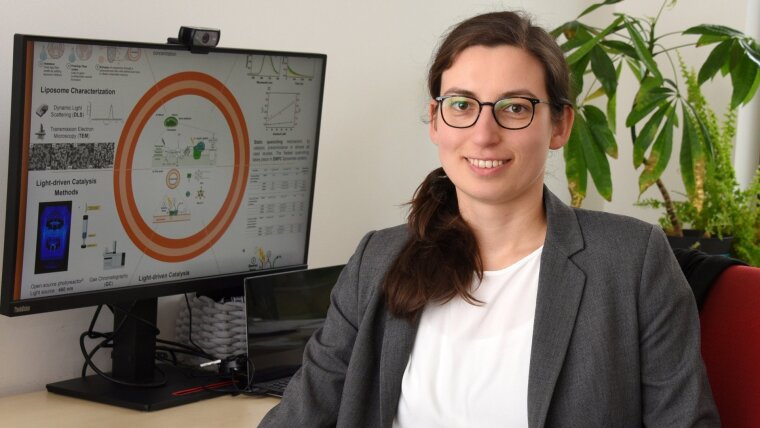
- Light
- Life
Published: | By: Marco Körner
Source article
Converting carbon dioxide with solar energy into usable compounds and producing hydrogen at the same time–that is Andrea Pannwitz's ambitious research goal. She is the new Junior Professor of Inorganic Chemistry at the University of Jena and is funded by the Carl Zeiss Foundation.
Solar Fuels from Carbon Dioxide
“Ideally, both processes would occur simultaneously,” the chemist explains. “That means, as we convert the carbon dioxide, we generate what is known as synthesis gas. This mixture of hydrogen and carbon monoxide is a valuable industrial raw material for producing new hydrocarbons.” These could, in the simplest case, be used as fuel. “These would be so-called solar fuels, i. e., fuels from solar energy. However, valuable basic chemicals are also conceivable, for example, to produce pharmacological agents,” adds Pannwitz.
As promising as the potential applications are, it is crucial to understand this conversion process as precisely as possible. “We are conducting fundamental research for this,” the scientist qualifies. “Making light energy chemically usable is highly complex: It requires suitable dyes that absorb the light and a catalyst that efficiently drives the desired reaction. Both must be coordinated with each other. And the entire system must be stable in the presence of water.”
Artificial Chloroplasts
Therefore, she and her team work with nano-membranes inspired by nature. Pannwitz explains: “Plants have chloroplasts in their cells, in which photosynthesis takes place. These chloroplasts consist of lipid bilayers, in which the active chlorophyll units that ultimately carry out the chemical reaction are embedded. Accordingly, in our research, we use lipid membranes inspired by nature. Into these, we embed the catalytically active units and also study how this local chemical environment affects the efficiency of the catalysis.”
For her work, she finds an ideal environment in Jena: “This place has a great strength in collaborative projects, such as the collaborative research centre CataLight, in which my team is involved,” judges Pannwitz. “In the future, I also want to engage in further collaborative projects that also involve light. And that fits perfectly in the City of Light, Jena.”
Showing Research Life from the Study Programme
In teaching, Andrea Pannwitz places great emphasis on directly introducing students to current research topics. “It is important to me that students in the Master’s or already in the advanced Bachelor’s programme understand the research, also based on knowledge from lectures and seminars.” For Pannwitz, this means, for example, designing seminars to be particularly interactive and introducing formats that are part of the research routine. “This could be a poster presentation or a lecture, as known from conferences,” she says. “Even a small publication with an internal review process brings elements of active research directly into the study programme.”
After her chemistry studies in Göttingen, Andrea Pannwitz was awarded her doctorate at the University of Basel in Switzerland in 2017 and subsequently she conducted research at the University of Leiden in the Netherlands. From 2020 to 2024, she was a Junior Professor and head of a junior research group at the University of Ulm. In Jena, her Junior Professorship follows the so-called tenure-track procedure and could potentially be converted into a full professorship in 2026. “Of course, I would like to stay in Jena, also because I still know the city well,” she says with a smile. “I went to school here, at the Carl Zeiss Gymnasium.” That her Junior Professorship is now funded by the Carl Zeiss Foundation, might be a good omen for her.
07743 Jena Google Maps site planExternal link